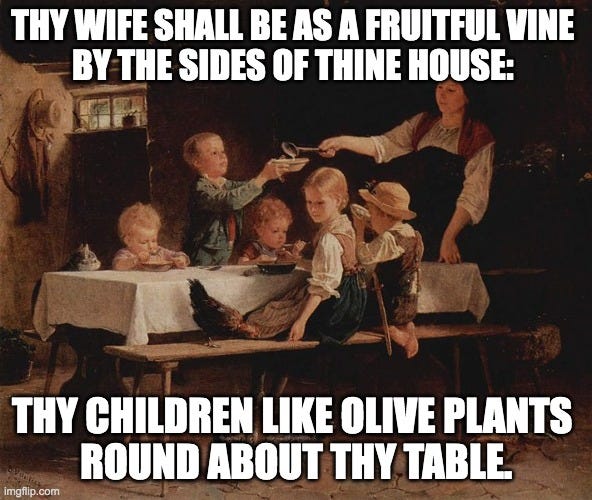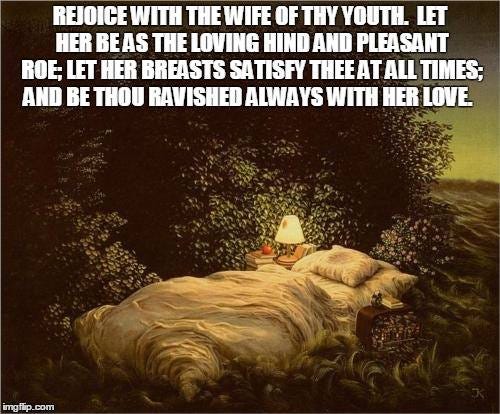The internet is awash with acronyms for social groups, especially modern social groups. You have ‘INCEL’, which at its core stands for ‘involuntarily celibate’; and usually refers to a young man who wishes to date, marry, have sex etc but cannot manage it. You have ‘INCHEL’, which I made up for a group that is less well-known but very real: young women who would like to have children but are beginning to recognise they never will (involuntarily childless).
And then you have ‘DINK’; which stands for ‘double income, no kids’… typically referring to a couple who are childless on purpose, and dual income on purpose, and who jet around on vacations revelling in their childfree lifestyle.
Standing opposed to that, and the subject of this post are ’SILK’… Single Income, Lots of Kids. Now a few years ago, like fifty or a hundred, this group would have needed no name. It was just ‘normal’. If you married young, the young man was responsible, and your marriage proceeded as it was supposed to, you would have a single income (the man’s income typically, although the women typically provided a great deal of value added in the way of savings and canning and the like, and perhaps a home garden and chickens or a cow) and lots of kids (birth control not being such a big thing, either technologically or culturally before about 1930).
But nowadays, a ‘SILK’ family stands out. Often way out.
The SILK marriage.
Pretty much by definition, the SILK family must have a marriage relationship which is different from that of their modern peers. The man and the woman will have much more clearly defined gender roles.
The man’s role is to provide the income; at least the external income, and he must have that focus. In some cases this can mean a home-focused income: where the family is doing small farming, or some other job that can be done ‘at home’ (such as an author) but, regardless, his focus must always be toward the outside world, which provides him first the money and then the goods that his family needs to survive and prosper.
The wife’s role, on the other hand, must typically be very home-focused. She is not off to some job for hours a day but, instead, is managing the house… and the children. There are hundreds of ways that the wife can create or preserve wealth in the house setting, but her primary focus is and must be managing the physical plant and the children.
This difference between the role of the man and the role of the woman means that a SILK marriage needs to have a very high ‘trust’ relationship. The man leaves his most valuable possessions, his children, largely in the hands of his wife. But the wife, in comparison to her peers, must do a good deal more trusting. Her entire income is dependent upon her husband, and, in having so many children, she has far more responsibilities, infinitely important responsibilities, than her DINK peers. If her husband dies or runs off with his secretary, she will suddenly be faced with a hugely different life.
The final fact which fixes this is a sufficiently plain one. Supposing it to be conceded that humanity has acted at least not unnaturally in dividing itself into two halves, respectively typifying the ideals of special talent and of general sanity (since they are genuinely difficult to combine completely in one mind), it is not difficult to see why the line of cleavage has followed the line of sex, or why the female became the emblem of the universal and the male of the special and superior. Two gigantic facts of nature fixed it thus: first, that the woman who frequently fulfilled her functions literally could not be specially prominent in experiment and adventure; and second, that the same natural operation surrounded her with very young children, who require to be taught not so much anything as everything. Babies need not to be taught a trade, but to be introduced to a world. To put the matter shortly, woman is generally shut up in a house with a human being at the time when he asks all the questions that there are, and some that there aren’t. It would be odd if she retained any of the narrowness of a specialist. Now if anyone says that this duty of general enlightenment (even when freed from modern rules and hours, and exercised more spontaneously by a more protected person) is in itself too exacting and oppressive, I can understand the view. I can only answer that our race has thought it worth while to cast this burden on women in order to keep common-sense in the world. But when people begin to talk about this domestic duty as not merely difficult but trivial and dreary, I simply give up the question. For I cannot with the utmost energy of imagination conceive what they mean. When domesticity, for instance, is called drudgery, all the difficulty arises from a double meaning in the word. If drudgery only means dreadfully hard work, I admit the woman drudges in the home, as a man might drudge at the Cathedral of Amiens or drudge behind a gun at Trafalgar. But if it means that the hard work is more heavy because it is trifling, colorless and of small import to the soul, then as I say, I give it up; I do not know what the words mean. To be Queen Elizabeth within a definite area, deciding sales, banquets, labors and holidays; to be Whiteley within a certain area, providing toys, boots, sheets, cakes and books, to be Aristotle within a certain area, teaching morals, manners, theology, and hygiene; I can understand how this might exhaust the mind, but I cannot imagine how it could narrow it. How can it be a large career to tell other people’s children about the Rule of Three, and a small career to tell one’s own children about the universe? How can it be broad to be the same thing to everyone, and narrow to be everything to someone? No; a woman’s function is laborious, but because it is gigantic, not because it is minute. I will pity Mrs. Jones for the hugeness of her task; I will never pity her for its smallness.
GK Chesterton
SILK Sex
This goes properly under the concept of ‘marriage’, but, again, the SILK sexual relationship is often very different from that of their peers.
First of all, sex in a SILK marriage tends to always lead to the possibility of yet another child. Not when the woman is already pregnant, perhaps, but most other times.
And sex in a SILK marriage tends to be way more frequent. Juggling two work schedules, not only the schedule itself but the stress, answering off-hours phone calls, etc., leads to many DINK couples having a hard time finding the time or energy to get together; let alone the emotional connection.
Added to that is the fact that in DINK marriages the decision to have sex is often problematic, as their view toward sex is strongly that it is an ‘optional’ activity, whereas in many SILK relationships the idea of having sex is assumed, expected.
Here’s a chart of the frequency with which American adults are reported to have sex:
10% did not have sex in the past year
7% had sex once or twice in the last year
17% had sex once a month
19% had sex twice or thrice per month
25% had sex weekly
16% had sex twice or thrice per week
5% had sex four or more times a week
https://www.webmd.com/sex-relationships/what-to-know-how-often-married-couples-have-sex
SILK Goals
DINK and SILK marriages differ almost completely in their goals. The DINK evaluates their life by how they feel about what is going on right then. How their life, their wife, their job, their income… makes them feel. That is the measuring stick for how they see themselves doing in their marriage and their life.
SILK, on the other hand, is other focused. How are my children doing?
SILK Foundation
There are a huge number of different ideas as to what goes to make a marriage. What marriage itself means. But there is something that must be at the root of a DINK marriage, and that is ‘trust’. Both parties in a SILK marriage need to trust the other. A DINK marriage that is destroyed by one or the other party is a big deal. All of those kids, the wife used to relying on her husband’s income… a big deal.
SILK marriages, on the other hand, are notoriously light. Here one day, gone another. No fuss, no muss… at least no messy custody battles.
What is Marriage?
The ultimate question in discussing SILK vs DINK is… what is marriage? What role do sex and children play in marriage? This question is not an idle one, nor a question of minor debate. Upon this question, and the answer to this question, lies the fate of civilisations. Marriage and the family is and has always been the bedrock of every civilisation. The idea that a couple (married or unmarried) should dedicate themselves to a life of pleasure instead of raising and training up the next generation is literally a death knell.
Thank you for reading Von’s Substack. I would love it if you commented! I love hearing from readers, especially critical comments. I would love to start more letter exchanges, so if there’s a subject you’re interested in, get writing and tag me!
Being ‘restacked’ and mentioned in ‘notes’ is very important for lesser-known stacks so… feel free! I’m semi-retired and write as a ministry (and for fun) so you don’t need to feel guilty you aren’t paying for anything, but if you enjoy my writing (even if you dramatically disagree with it), then restack, please! Or mention me in one of your own posts.
If I don’t write you back it is almost certain that I didn’t see it, so please feel free to comment and link to your post. Or if you just think I would be interested in your post!
If you get lost, check out my ‘Table of Contents’ which I try to keep up to date.
Thanks again, God Bless, Soli Deo gloria,
Von
Links
What is Marriage #3B
The horseleach hath two daughters, crying, Give, give. There are three things that are never satisfied, yea, four things say not, It is enough: The grave; and the barren womb; the earth that is not filled with water; and the fire that saith not, It is
“…don’t let your snarky neighbor or nosy relatives make you feel guilty about a choice that makes you happy.”https://www.bonobology.com/awesome-reasons-childfree/










Single income and two kids.
While I would not consider three a lot of kids, it is fairly uncommon where I live, and it is quite interesting to watch the differences in our relationship compared to many of our friends and my coworkers.
The trust is absolutely key, but I think it misses the flipside, which is the added gratitude and respect. I could not do what my wife does, and am extremely grateful for her sacrifice. She in turn demonstrates immense gratitude for my willingness to leave the house and family, working to make sure all the needs are met. Trust is required, but it pays massive dividends.
I will point out that I have a cousin and a friend where this applies, but the roles are reversed. She works, he takes care of the home. This seems to work well for both of them, given their dispositions. Both of the females are Type A personalities, and both married men who are far more nurturing and patient than I suspect you would find in the average American male. I am not sure that set up would work for plenty of couples, but for some, the flexibility seems to be a boon for them.